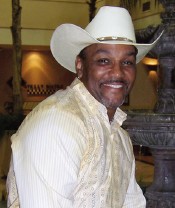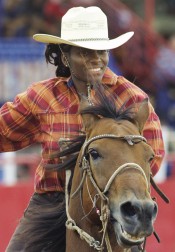|
This year’s National Western Stockshow is a bonanza. Denver’s famed conclave of cowboys and cattle will boast a colorful display of rodeo excellence heavy on diversity and substance. Mexican buckaroos will alternate with Black vaqueros. On Jan. 16, at 7 p.m., the stars are set to align into a stunning allegory of Black culture’s past, present, and future.

Carolyn Carter
Ladies Steer Undecorating and
Barrel Racing Champion
At the Denver Coliseum, the National Western Stockshow promises an evening where, "Stock Show fans can partake in the history and heritage of America's black cowboy as top black rodeo athletes and Buffalo Soldiers headline the National Western's first-ever Martin Luther King African-American Heritage Rodeo." The evening represents a personal triumph for Lu Vason as the city celebrates the great Civil Rights leader’s struggles and triumphs. Vason waged his own struggle for Black equality and recognition of an influential and integral aspect of African-American culture; the Black cowboys and cowgirls who historically took a back-seat to the Hollywood ideals of Western heroes.
In a much less dramatic fashion, Vason has assumed Dr. King’s mantle--and in a much less dramatic fashion, Vason is also becoming a celebrity. After burnishing the careers of stellar musicians like the Pointer Sisters, he set about promoting the legacy of a superstar who is long deceased--Bill Pickett. Before Vason introduced the rodeo champ to the general public, Pickett had faded from American history and few had heard his name, much less had honored his achievements.
Vason committed to resurrecting Pickett’s lackluster legacy into a living memorial and by doing so he not only propelled the late cowboy into a quasi-household name, but saw his own star rise. Today, Vason has assured Pickett’s immortality and can claim his own perch in the rodeo pantheon.
The days of global audiences being astonished by images of Black cowboys are long over. However, Vason still aims for a higher consciousness and general awareness. "My vision is on course," Vason said about his goal of educating African Americans about an important part of their history, and creating a general awareness about the presence of African Americans on America’s frontier.

Jesse Guillory
Bareback Bull Dogging Champion,
All-Around Cowboy
Long gone are the days when Vason had to convince people that African American cowboys and cowgirls really existed. Their reality was never a figment of Vason’s imagination, as some might have originally believed. Embedded in his imagination 20-odd years ago was the reality today of a transcontinental awareness and appreciation of the African American Westerner.
He is satisfied that more people are becoming hip to the notion of African Americans excelling at rodeo competitions. "Now there’s an excitement; an aura that there are Black cowboys" and, he quickly adds, "cowgirls."
However, one gets the impression that Vason won’t be satisfied until Bill Pickett and his compadres’ presence in Western folklore is recognized as easily to audiences as are the celluloid images of Roy Rogers and Wyatt Earp. The closest many urbanites get to cattle and ranches are in the pages of a Larry McMurty novel. So it’s understandable that many Americans are surprised to learn that African Americans have always ridden high in the saddle along with Clint Eastwood and John Wayne types that inform the national conscious about the Western cowboy.
Inspired by the dedication of the Black American Western Museum in Denver in the early ‘80s, Vason imagined a world-class rodeo to entertain and edify audiences. He began a quest to enlighten America about the Black contributions to the cowboy legacy in 1984 when he presented the first William "Bill" Pickett Invitational Rodeo. Now, in its 22nd year, Vason has realized his goal of letting loose the long-held secret of African-American cowboys and cowgirls.
The rodeo carries the name of perhaps the most revered Black cowboy. Denver journalist Tom "TJ" Jacques told me that William "Bill" Pickett is reputed to be the greatest sweat-and-dirt cowhand who ever lived. That lofty assertion is justified by Pickett’s career. His life ended in a frenzied ride on a bronco in 1937, but the legend supports his inclusion in rodeo’s hall of fame.
Pickett’s enduring contribution, "bulldogging," is a wrestling match, where a cowboy pins the bull to the ground. Pickett would nip the bull’s upper lip, paralyzing the animal with either pain or shock at the audacity.
|
|
When the bull’s power is minimized, a cowboy is able to dominate his raging opponent. The sport has since become a rodeo staple. The Bill Pickett Rodeo also features calf-roping, bull-riding, bronco-riding, barrel racing for women, and plenty of cowboys and cowgirls.
African Americans’ hushed involvement has escaped contemporary accounts of the American West’s legacy. Past Urban Spectrum features have highlighted history, such as the fact that the real trailblazers weren’t Lewis and Clark, but a Black man scouting for the legendary expedition. Equally forgotten is a Black cowboy who history knows only as Estavencio. His journey landed him in Texas on a speculative jaunt well before the trumpeted White cowboys. Will Rogers was coached in the saddle by a Black man. That same Black man instructed the legendary cowboy in how to handle a rope. "We’re shattering a lot of myths. One out of four cowboys that helped develop the West were Black," noted former Spectrum contributing writer Gordon Jackson.

Bobby Harrison
Bull Dogging Champion,
Walk of Fame Inductee
Vason is largely responsible for shattering those myths. With all of the accolades showered on the William "Bill" Pickett Rodeo during the past two decades, it’s easy for writers to either dismiss or ignore Vason’s stunning pre-Pickett successes as a music impresario. He not only jump-started the Pointer Sisters career, but his guidance of The Whispers helped amplify their soulful, soothing serenades into a sound that was loudly heard throughout the world.
Working with Barry Fey, Vason promoted concerts in Denver featuring America’s greatest musical icons. He also presented performances elsewhere by everyone from Prince to Stevie Wonder. Had Vason not detoured into rodeo, it’s easy to imagine him commanding the stature of a Berry Fey or Bill Graham in the music industry. Instead, Vason channeled the professional experience and his instinctual ability to present talent to the public into the rodeo arena.
The task was daunting. Even though Vason had triumphed at concert promotions and business, others had already blazed the path. Vason had a roadmap to guide his promotion of Black musicians. The ‘60s soul music titans swept Dr. King’s speeches into living rooms and performance venues, creating a soundtrack for an era. Black artists like the Pointers Sisters no longer had to demand R-E-S-P-E-C-T from the music industry simply due to their skin tone--unlike most of the pre-Aretha musicians. But Vason didn’t have a template for pushing Black rodeo performances... other than reaching back nearly a century to the times of none other than Bill Pickett, himself.
Vason managed that obstacle course with the same acumen that managed the careers of musicians. Saddled with an uninformed public, Vason galloped around the nation with his stable of Black cowboys and cowgirls. He attracted audiences dazzled by the prowess of the rodeo performers, not the novelty of Black rodeo stars. Entertainment drew people to the stockyards and stadiums. But the William "Bill" Pickett Invitational Rodeo did more than entertain, it informed and acclimated. The spectacle of Black rodeo stars soon became surpassed by the spectacle of superior performers, making race immaterial. Only then did the notion of Black cowboys and cowgirls not seem so exotic--it seemed natural.

Stephani Haynes
Ladies Steer Undecorating and
Barrel Racing Champion,
All-Around Cowgirl
As Vason’s fame spread, so did his aspirations. He’s constantly seeking new venues to expand Bill Pickett’s legacy. Vason’s itinerary includes international dates and publicity praising both his expertise and the rodeo appear in national publications and programs. He’s appeared on NPR and in the Washington Post. The man who once wrote an entertainment column for the Berkeley Post is now the subject of newsprint rather than the scribe. But Vason retains the probing perception of a journalist. The William "Bill" Pickett Invitational Rodeo is a tome of Black history that Vason has scripted for contemporary society. He is on constant assignment, observing his subjects--the past and present Black cowboys and cowgirls--and reporting to the world not only their amazing past, but their immediate relevancy. Vason’s professional personality is a summation of the traits that are championed in leaders. Today, he carries on the torch of not only Bill Pickett, but also the ideals of Dr. King. His resume is sprawling and impressive--journalist, entrepreneur, showman, educator, and curator. Vason and the National Western Stockshow are both keeping The Dream alive this January in honor of Dr. King’s birthday.
|